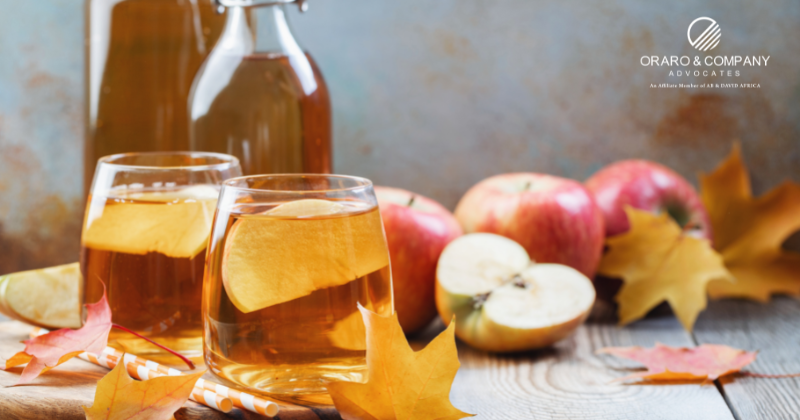Background
In a Judgment delivered by Hon. Mr. Justice D. S. Majanja on 31st October 2022, the High Court in Income Tax Appeal E157 of 2021 Commissioner of Customs and Border Control v Kenya Breweries Limited upheld the decision by the Tax Appeals Tribunal (“the Tribunal”) that apple concentrate, an ingredient used in the manufacture of cider, is a raw material and not a beverage hence classifiable under Heading 2106.90.20 for tariff purposes. Our previous alert on the Tribunal’s decision can be found here.
The dispute stemmed from Kenya Breweries Ltd (“KBL”) requesting the Commissioner of Customs and Border Control (“the Commissioner”) for a Tariff Ruling on apple concentrate wherein KBL provided details of the product’s composition, its intended use and KBL’s proposed tariff code 2106.90.20 (preparations of a kind used in the manufacture of beverages) based on the concentrate’s intended use, which attracted a duty rate of 10%. The Commissioner, in its Tariff Ruling classified the product under tariff 2206.00.90 (other fermented beverages) which attracted a duty rate of 25%. Dissatisfied with the Tariff Ruling, KBL lodged a Review Application, but the Commissioner maintained its classification in a Review Decision.
Aggrieved by the Review Decision, KBL appealed against the same to the Tribunal in Tax Appeal No. 282 of 2020: Kenya Breweries Limited v Commissioner of Customs & Border Control (2020) eKLR, wherein the Tribunal allowed KBL’s appeal and set aside the Tariff Ruling. In so doing, the Tribunal held that the apple concentrate that KBL intended to import for manufacturing Tusker Cider, an alcoholic beverage is classifiable under HS Code 2106.90.20 (food preparations) of the East African Community Common External Tariff, 2017 (CET), thus subject to a lower customs rate.
The Law on Classification of Commodities
The East African Customs Management Act, 2004 (“EACCMA”) governs customs administration in the East African Community and the CET governs the classification of imported goods for the purpose of duty calculation. The CET ought to be interpreted in accordance with the World Customs Organization’s (“WCO”) General Interpretation Rules for the Interpretation of the Harmonized System (“GIRs”) and the explanatory notes developed by the World Customs Organization.
GIR 1 provides that: “The titles of sections, chapters and sub-chapters are provided for ease of reference only; for legal purposes, classification shall be determined according to the terms of the headings and any relative section or chapter notes.” In essence, when classifying a commodity, one should first refer to the terms of the headings of that subject then the terms of the section then the relevant chapter notes.
Submissions by the Parties
The essence of the Commissioner’s eleven (11) grounds of appeal was its claim that the concentrate was classifiable under Heading 2206. Particularly, the Commissioner argued that the product was a juice that would ordinarily be classifiable under Chapter 20 (fruit and vegetable juices). The Commissioner then relied on the exclusionary note (d) to Chapter 20 (which provides that fruit juices with an alcoholic content exceeding 0.5% were classifiable under Heading 2206 to classify the product under Heading 2206.00.90 arguing that it was the only code that provided an apt description of the product.
KBL, on the other hand, maintained that the concentrate was not a beverage as claimed by the Commissioner, but a preparation used in the manufacture of a beverage.
The Decision
Having heard the parties, the Court noted that an appeal from a decision of the Tribunal to the High Court could only be on issues of law. The Court further noted that the East African Community had adopted the Harmonized Commodity Description and Coding System (“the Harmonized System”) during its establishment which is supported by Explanatory Notes that constitute its official interpretation.
In its determination, the Court noted that the Commissioner’s witness admitted that the concentrate was a raw material for use in the manufacture of cider and that Note 20(d) dealt only with juices and not concentrates.
The Court restated that KBL bore the burden of proving that the Commissioner’s classification and found that KBL had discharged this burden and proven that the concentrate was not a juice and thus could not be subject to Explanatory Note (d) to Chapter 20. As a result, the Commissioner’s attempt to rely on Explanatory Note (d) to Chapter 20 which excludes vegetables or juices of an alcoholic strength by volume exceeding 0.5% vol to refer the product to Chapter 22 (beverages) could not stand.
The Court agreed with KBL that alcoholic content was not a factor for consideration in the determination of whether or not a product is classifiable under tariff code 2106.90.20. The Court found that KBL’s classification of the concentrate under 210.90.20 prima facie fell within the language of the Tariff Heading, Section and Chapter Notes and was within the interpretation rules of the GIR. The Court, therefore, found that the Tribunal’s decision was reflective of the evidence before it. Accordingly, the High Court dismissed the Commissioner’s Appeal for lack of merit.
Please click here to download the alert.
This alert is for informational purposes only and should not be taken to be or construed as a legal opinion. If you have any queries or need clarifications, please do not hesitate to contact Renee Omondi, Partner, ([email protected]), and Nzioka Wang’ombe, Associate, ([email protected]) or your usual contact at our firm, for legal advice.





